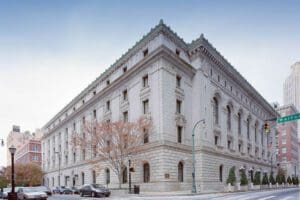Alabama can enforce law banning gender-affirming care, appeals court panel rules
A three-judge panel of the 11th Circuit Court of Appeals overturned an injunction that had been placed on the Alabama law by a federal district judge.

Alabama can enforce its law banning gender-affirming care for minors in the wake of the ruling on Aug. 21 of a panel of the 11th U.S. Circuit Court of Appeals.
The three-judge panel, made up entirely of judges appointed by President Donald Trump, vacated a lower court’s injunction blocking the Vulnerable Child Compassion and Protection Act.
Signed by Gov. Kay Ivey in April 2022, the law was quickly challenged in a lawsuit brought by four parents of transgender youth in Alabama. Shortly after the law went into effect in May 2022, U.S. District Judge Liles Burke issued a preliminary injunction blocking its enforcement. Burke was also appointed by Trump.
The law makes it a felony offense for anyone to treat minors with puberty blocking drugs or what it calls “cross-sex” hormones, or to provide gender-affirming surgeries to minors, unless the purpose is to treat individuals with “irresolvably ambiguous” sex characteristics or diagnosed sexual development disorders.
Another section of the law makes it illegal for school employees, including teachers, to “withhold from a minor’s parent or legal guardian information related to a minor’s perception that his or her gender or sex is inconsistent with his or her sex,” or to encourage a minor to do the same. However, only the prohibitions on gender-affirming medical care had been blocked by the injunction.
Judge Barbara Lagoa wrote In the 11th Circuit panel’s opinion: “On review, we hold the district court abused its discretion in issuing this preliminary injunction because it applied the wrong standard of scrutiny. The plaintiffs have not presented any authority that supports the existence of a constitutional right to ‘treat [one’s] children with transitioning medications subject to medically accepted standards.’”
Lagoa’s opinion makes references to Dobbs v. Jackson Women’s Health Organization, the Supreme Court ruling that overturned a federal right to abortion, writing that “courts must look to whether the right is ‘deeply rooted in [our] history and tradition’ and ‘essential to our Nation’s ‘scheme of ordered liberty.’”
While access to gender-affirming care for minors is the issue in the case, Lagoa writes in a footnote that “there has been no showing of any historical recognition of a fundamental right of adults to obtain the medications at issue for themselves.”
Lagoa refers to the opioid epidemic in raising questions about access to gender-affirming care: “As Alabama suggests, the opioid epidemic has shown firsthand the need to be skeptical and exercise caution when there is a sudden uptick in prescriptions of powerful, off-label medications, even when some medical and pharmaceutical organizations defend their safety.”
The groups providing legal counsel to the plaintiffs in the case issued a statement pledging to keep fighting. Though they did not immediately announce an appeal, the groups said the case “is far from over.”
“The National Center for Lesbian Rights, GLBTQ Legal Advocates & Defenders, the Southern Poverty Law Center and Human Rights Campaign, which provided legal counsel to the plaintiffs, said in a joint statement: “While this is a setback, we are confident that it is only a temporary one. Every federal district court that has heard the evidence presented in these cases has come to the same conclusion: these medical treatments are safe, effective, and lifesaving for some youth, and there is no legitimate reason to ban them.”
In the statement, the groups said: “Parents, not the government, are best situated to make these medical decisions for their children. These laws are a shocking example of government overreach and a jarring intrusion into private family decisions. This case is far from over, and we will continue to aggressively seek legal protection for these families.”
With the panel’s decision, Alabama joins other states in which injunctions against laws banning gender-affirming care for minors have been vacated. A panel of the 6th U.S. Circuit Court of Appeals voted 2-1 in July to allow similar laws in Kentucky and Tennessee to go into effect.
A trial on whether to permanently block Alabama’s gender-affirming care ban is scheduled for April 2024 in the district court that granted the original preliminary injunction.
Published with permission of The American Independent Foundation.
Recommended

Ohio doctors fear effects of emergency abortion care case set to go before U.S. Supreme Court
A federal law that allows emergency departments to treat patients without regard to their ability to pay will be under U.S. Supreme Court scrutiny this week, and Ohio doctors are concerned about the case’s local impact on emergency abortion care.
By Susan Tebben, Ohio Capital Journal - April 23, 2024
House GOP votes to end flu, whooping cough vaccine rules for foster and adoptive families
A bill to eliminate flu and whooping cough vaccine requirements for adoptive and foster families caring for babies and medically fragile kids is heading to the governor’s desk.
By Anita Wadhwani, Tennessee Lookout - March 26, 2024
U.S. House Speaker Johnson says IVF should be protected — just not by Congress
U.S. House Speaker Mike Johnson said Thursday that it’s up to states and not Congress to preserve access to in vitro fertilization, weighing in on a growing national debate and campaign issue.
By Jennifer Shutt, States Newsroom - March 14, 2024









































































